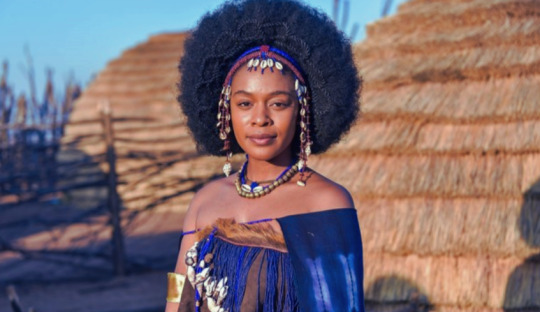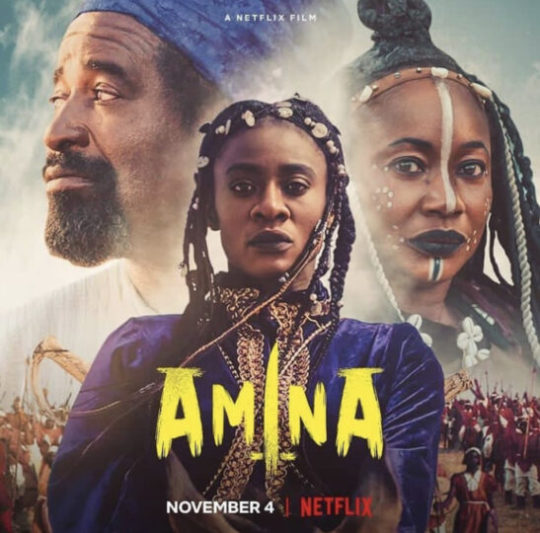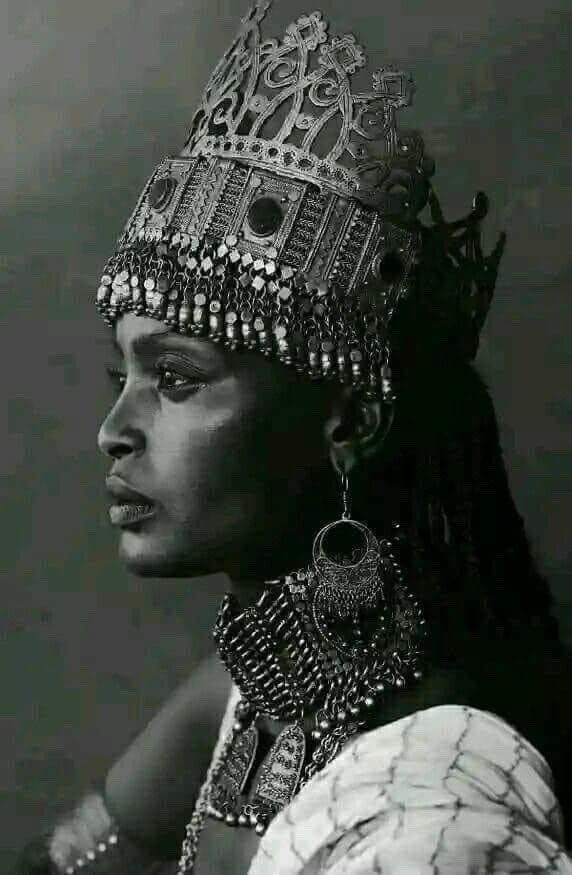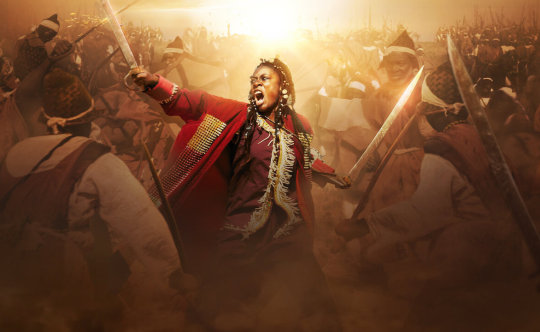#amina of zazzau
Text
Historical Queens of Africa in Movies



Queen Nandi (Mother of Shaka), (Shaka Ilembe, 2023))
Queen Nzinga of Ndongo and Matamba, (Njinga: Queen Of Angola, 2013)
Queen Amina of Zazzau, (Amina (Netflix), 2021)
#black royalty#black women#black queens#african royalty#queen nandi#amina of zazzau#Njinga#Nzinga#netflix#shaka zulu#shaka ilembe#hopefully there will be more adaptions in the future
18 notes
·
View notes
Text
Netflix movie about a Real African Warrior Queen
Amina

The movie is about Amina, a Queen who lived in the sixteenth century city-state Zazzau (known as Zaria, in Nigeria).
It's not known if she really ruled Zazzau, but if she did, then she really rocked!
The movie is definitely not historically accurate, it was made in the English language entirely and all, but it paints a cool picture of what her rule might've been like. Besides, I found it really fun to watch.
It's really inspiring to see a Warrior Queen, and I'm definitely a fan of these! As long as they are believable to me!
Definitely the best (and only one I remember) African badass queen movie I've ever seen so far!
youtube
Have fun!
#amina#africa#warrior queen#african warrior queen#zazzau#hausa#netflix#strong women of history#history#strong women#Youtube
5 notes
·
View notes
Text
Amina - The Legendary Queen of Zazzau
Amina, often revered as the legendary Queen of Zazzau, left an indelible mark on the history of the Hausa people and the region of present-day Nigeria. Her legacy, shrouded in both mystery and admiration, paints a portrait of a remarkable leader who defied conventions and propelled her kingdom to prominence.
Rumored to have ascended to the throne in the mid-sixteenth century, Queen Amina’s reign…

View On WordPress
#African Art#African History#Amina#Hausa history#Queen of Zazzau#West African#West African history#Zazzau kingdom
0 notes
Text
The story of Amina (Queen of Zazzau)
Amina (also Aminatu; died 1610) was a Hausa Muslim historical figure in the city-state Zazzau (now city of Zaria in Kaduna State), in what is now in the north-west region of Nigeria. She might have ruled in the mid-sixteenth century. A controversial figure whose existence has been questioned by some historians, her real biography has been somewhat obscured by subsequent legends and folk…
View On WordPress
1 note
·
View note
Text

Seven Great African Queens You Should Learn About:
1)- Queen Amina of Zazzau (Nigeria)
2)- Queen Makeda of Egypt and Ethiopia
3)- Queen Kandake of Ethiopia
4)- Queen Nefertiti of Ancient Kemet (Egypt)
5)- Queen Mother Yaa Asantewaa I of Ashanti Kingdom (Ghana)
6)- Queen Nandi of Zulu Kingdom (South Africa)
7)- Queen Moremi of Ile-Ife Kingdom (Nigeria)
These Great African Queens existed, but we were not taught about them in school.
338 notes
·
View notes
Text







In pre-colonial Africa, women's leadership diverged from Western narratives of breaking the ultimate glass ceiling. Esteemed positions of power were more commonplace, with women serving as rulers, queens, and spiritual leaders. Their contributions were integral to community functioning, viewed as a natural aspect of societal organization rather than exceptional feats. This perspective reflects Africa's tradition of female empowerment.
African history is replete with influential queens who left indelible marks on their societies. Queen Amina of Zazzau expanded her kingdom and defended against threats, while Queen Nzinga resisted Portuguese colonialism, securing independence for her kingdom. Queen Modjadji VI, the Rain Queen of the Balobedu, preserved ancestral traditions and spiritual authority, embodying resilience and wisdom. Just to name a few, these queens inspire generations with their courage and vision, shaping African legacies.
Pre-colonial African societies embraced egalitarian or matrilineal social systems, valuing harmony between feminine and masculine principles. Many revered both male and female deities, recognizing the significance of feminine energy alongside masculine energy in the universe's natural order. Women often held roles as spiritual leaders and decision-makers, particularly in matrilineal societies. Traditional African cosmology emphasized interconnectedness and harmony between complementary forces, reflecting gender balance even amidst at-times prevalent patriarchal structures.
Let us reflect on the rich tapestry of female empowerment woven throughout Africa's history. From the esteemed queens who shaped kingdoms to the everyday women who led their communities, their resilience, wisdom, and vision have left an indelible mark on our world. Let us honor their legacies not just this month, but every day, by continuing to strive for equality, justice, and recognition of women's contributions in all spheres of life.
More info:
https://buff.ly/3TXmDHD
https://buff.ly/43IqCLe
https://buff.ly/3TXGVRb
4 notes
·
View notes
Text
AMINA SUKHERA
The great African woman called Amina Sukhera was a Princess of Zazzau (now Zaria), in North West Nigeria. The Great African woman called Amina Sukhera was a princess of Zazzau (now Zaria), in what is now northern Nigeria. She was born near the year 1533 and died about the year 1610. The Arabic name Amina means truthful, trustworthy and honest. Amina Sukhera was a fierce warrior. According to tradition, as a child, Amina’s grandmother once caught her holding a dagger. As an adult, Amina refused to marry, and helped Zazzau (Zaria) become a focal point for trade and commercial activity. She also expanded its territory. The introduction of kola nuts into cultivation in the area is attributed to Amina. A statue at Amina at the National Arts Theatre in Lagos, Nigeria, honors her, and numerous educational institutions bear her name. Her military achievements brought her great wealth and power. She is credited as the architect of the earthen walls around the city of Zaria, for which the province is named. In her thirty-four year reign, she expanded the domain of Zazzau to its largest size.

20 notes
·
View notes
Text
AMINA // EMIRA OF ZAZZAU
“She was Emira (or Queen) of Zazzau (present day city of Zaria in Kaduna State, Nigeria) and is thought to have ruled in the mid sixteenth century. At the age of sixteen, she was named Magajiya (heir apparent). She had a number of suitors attempt to marry her. After the death of her parents, her brother became King of Zazzau, and she herself had distinguished herself as a “leading warrior in her brother’s cavalry” and gained notoriety for her military skills. After the death of her brother, she ascended the throne and within three months, she waged a 34-year campaign against her neighbours to expand Zazzau territory. She conquered large tracts of land as far as Kwararafa and Nupe. It's said that she took a new lover in every town she went though, each of whom was said to meet the same fate in the morning by being beheaded.”


1 note
·
View note
Text
Kobieta w Mitologii Afryki: Boginie i Kobiety
Wprowadzenie
Mitologia Afryki jest niezwykle różnorodna i bogata, odzwierciedlając różnorodność kulturową i etniczną tego kontynentu. Kobieta w mitologii afrykańskiej zajmuje szczególne miejsce, odgrywając kluczową rolę jako boginie, herosi, i postacie o ogromnym znaczeniu kulturowym. W tym eseju naukowym skoncentrujemy się na roli i znaczeniu kobiet w mitologii Afryki, analizując boginie i kobiety, które odegrały istotną rolę w wierzeniach i opowieściach tego kontynentu.
Rozdział 1: Kobieta w Mitologii Afryki - Kontekst Kulturowy
Aby zrozumieć rolę kobiety w mitologii Afryki, warto najpierw przyjrzeć się kontekstowi kulturowemu. Afryka jest jednym z najbardziej zróżnicowanych kontynentów pod względem kultur, języków i wierzeń. Mitologie afrykańskie odzwierciedlają tę różnorodność, a rola kobiety może być różna w zależności od regionu. Niemniej jednak, istnieją pewne uniwersalne motywy i wzorce, które można znaleźć w mitologiach różnych części Afryki.
Rozdział 2: Boginie Afrykańskie - Siła, Piękno i Płodność
Boginie w mitologii Afryki często symbolizują różne aspekty życia i natury. Przykłady takich bogiń obejmują:
- **Oshun** (Nigeria): Oshun jest boginią miłości, piękna i wód. Jest również uważana za opiekunkę płodności i działań twórczych. Kult Oshun jest szczególnie ważny w kulturze Yoruba.
- **Isis** (Egipt): Chociaż Egipt leży na pograniczu Afryki i Bliskiego Wschodu, kult bogini Isis miał duże znaczenie w mitologii starożytnego Egiptu. Isis była uważana za boginię miłości, opiekunkę rodzin i płodności.
- **Mawu-Lisa** (Benin): W mitologii Fon ludu z Benin, Mawu-Lisa to dualistyczna bogini nieba i ziemi. Reprezentuje równowagę i harmonię w kosmosie.
- **Nana Buluku** (Afryka Zachodnia): Nana Buluku to bogini nieba i gwiazd w mitologii ludu Fon. Jest uważana za najwyższą istotę i opiekunkę wszechświata.
Rozdział 3: Kobiety-Wojowniczki i Bohaterki
Mitologia afrykańska obfituje również w opowieści o bohaterskich kobietach i wojowniczkach. Przykłady to:
- **Amina** (Nigeria): Amina była królową miasta-państwa Zazzau (obecnie Zaria) i legendarnej wojowniczką. Jej władza i umiejętności militarnego dowodzenia są często podkreślane.
- **Makeda (Królowa Saby)**: Makeda, znana również jako Królowa Saby, jest postacią biblijną z Księgi Królewskiej. Jej historia jest ściśle związana z historią króla Salomona.
- **Nzinga Mbande** (Angola): Nzinga była królową Ndongo i Matamba w XVII wieku. Była zarówno wojowniczką, jak i dyplomatką, broniącą swojego ludu przed kolonialnymi najeźdźcami.
- **Yaa Asantewaa** (Ghana): Yaa Asantewaa była wojowniczką i dowódczynią w czasie wojen przeciwko brytyjskim kolonialistom w Asante. Jej determinacja i odwaga były inspiracją dla wielu.
Rozdział 4: Kobieta w Afrykańskiej Mitologii Dziś
Współczesna Afryka nadal czerpie z mitologii i wierzeń swoich przodków. Kobieta w mitologii afrykańskiej ma wpływ na kształtowanie tożsamości i kultury współczesnych społeczeństw. W dzisiejszych czasach kobiety afrykańskie odgrywają ważne role jako liderki, artystki, naukowczynie i działaczki społeczne, kontynuując tradycje siły i odwagi swoich mitologicznych poprzedniczek.
Podsumowanie
Mitologia Afryki ukazuje bogactwo i różnorodność kulturową tego kontynentu, a rola kobiety w tych mitach jest niezwykle istotna. Boginie afrykańskie symbolizują różnorodne aspekty życia i natury, a kobiety-wojowniczki stają się inspiracją dla współczesnych społeczeństw. Mitologia Afryki przypomina nam o niezwykłej sile, determinacji i pięknie kobiet w tym regionie, które od wieków przyczyniają się do kształtowania historii i kultury kontynentu.
0 notes
Video
instagram
Y'all been known I been talked about this brutha FOR. YEARS. Him. Ngola Ginga. Ngola Teresa de Benguela. Toussaint Louverture. John Horse. Kandake Maaktare. Jean Michel. Sarauniya Amina of Zazzau. The mighty, brilliant, impassioned Antar. The terrifyingly skilled, endlessly tenacious and talented, fiercely brilliant Quoba The Asante, successfully defying lions and enslavement in Brasil. And many more important people and facts. #liker #likers #like #sungod #ra #atacxgymcapoeira #atacxgym #atacxgymnation #atacxgymstreetwarriorcapoeira #attacklife #smaitawi #kipura #njiauhurukipura #follow #capoeiraselfdefense #capoeiraselfdefensetechniques #iam #atacxgymstreetwarriors #blackmenstyle #followme #greatness #BlackManMagic #iamblackhistory #melaninboard #africanamerican #instagood #daily #afrocentric #instadaily #beingblackislit WEBSITE/SITE: https://sites.google.com/view/atacxgymcapoeira YOUTUBE: https://youtube.com/c/ATACXGYMCAPOEIRA INSTAGRAM: instagram.com/atacxgymcapoeira/, TWITTER: https://twitter.com/atacxgym, BLOG: atacxgymcapoeira.blogspot.com :FACEBOOK GROUP PAGE: https://www.facebook.com/groups/capoeiraselfdefensethatworks/ FACEBOOK PERSONAL ATACX GYM PAGE: https://www.facebook.com/AtacxGymStreetWarriorCapoeira https://www.instagram.com/p/ClDz-Ieg76v/?igshid=NGJjMDIxMWI=
#liker#likers#like#sungod#ra#atacxgymcapoeira#atacxgym#atacxgymnation#atacxgymstreetwarriorcapoeira#attacklife#smaitawi#kipura#njiauhurukipura#follow#capoeiraselfdefense#capoeiraselfdefensetechniques#iam#atacxgymstreetwarriors#blackmenstyle#followme#greatness#blackmanmagic#iamblackhistory#melaninboard#africanamerican#instagood#daily#afrocentric#instadaily#beingblackislit
0 notes
Photo

QUEEN OF ZAZZAU
22 notes
·
View notes
Text
Amina of Zazzau: Netflix and ahistorical film-making, By Ibrahim Lawal Ahmed
Amina of Zazzau: Netflix and ahistorical film-making, By Ibrahim Lawal Ahmed
…it is commendable to make a film based on an historical account and which is inspired by legendary figures, however filmmakers need to know that such films shouldn’t be contrived along Shakespearean lines. They need to do their homework to get the authentic account of the story they are re-narrating… the blunders of the Netflix film, Amina, should urge us to take the study of history more…

View On WordPress
#Amina#Hausa Culture#Islamic traditions#Netflix#Queen Amina of Zazzau#Queen Daurama of Daura#Sheikh Usman Dan Fodio#Zazzau Kingdom
0 notes
Photo

Aminatu by David Dennis
You can see the making of process on my Patreon.
https://www.patreon.com/posts/aminatu-15135545
Buy Prints Here
Instagram | Twitter
#princess#beauty#love#amina#hausa#zazzau#fortress#anime#manga#ilustration#cool#masterpiece#instafav#sketch#doodle#concept#design#character#afro#africa
676 notes
·
View notes
Text
“As long as you focus on one historical figure, or one cluster of women, or on one historical period, it is easy to believe any individual woman warrior was indeed an exception who stood outside the norm of her time—created by a national crisis or an anomaly of inheritance—and who consequently stands outside the norm of history as a whole. One of John Keegan’s “insignificant exceptions.” There is, after all, only one Joan of Arc. The number of women who enlisted disguised as men in any given war is statistically insignificant. The circumstances that led women to fight at the siege of Sparta or Tenochtitlan or Leningrad were desperate. And so on.
Looking at women warriors in isolation, it is also easy to accept the way in which the accomplishments (or even existence) of a specific woman warrior are dismissed. That Telesilla or Kenau Simonsdochter Hasselaer or Artemisia II didn’t do what the sources claim she did. That an unknown man stood behind Matilda of Tuscany pulling the military strings. That Fu Hao played no more than a symbolic role on the battlefield. That Mawiyya or Kit Cavanagh didn’t exist. That any ancient remains buried with a sword are male. That the women who stood on the ramparts and fought back don’t count as warriors because if they were soldiers (and therefore men) the fact that they stepped forward to fire a cannon or picked up a rifle wouldn’t be worth remarking on. Looking at women warriors in isolation, it doesn’t matter that Katherine of Aragon successfully defended England against invasion because everyone knows the important part of her story is Henry Tudor’s inability to father a son. You can overlook the fact that Alexander the Great or Edward the Elder of England had a sister who led troops into battle. When you step back and look at women warriors across the boundaries of geography and historical period, larger patterns appear—parallels not only between the stories of the women themselves but in the ways their stories are told and not told. Some times, places, and social structures are more accepting of women warriors than others. (As a general rule, horse-based cultures, honor cultures, and tribal societies do a better job with the concept than large empires or regular armies—with the extraordinary exception of China.) The accomplishments of women are questioned, undercut, and ignored by scholars in consistent ways across periods. There are unexpected linkages between women, particularly between mothers and daughters—looked at in the context of Cynane, Matilda of Tuscany, Katherine of Aragon, and Amina of Zazzau, the legend that the Trung sisters learned the arts of war from their mother seems a lot more possible.
But the main thing that struck me when I looked at women warriors across cultures rather than in isolation is how many examples there are and how lightly they sit on our collective awareness. I began with hundreds of examples. I ended with thousands. (...)
Exceptions within the context of their time and place? Yes. Exceptions over the scope of human history? Not so much. Insignificant? Hell, no!”
Women warriors: an unexpected history, Pamela D. Toler
#women warriors in general#history#women in history#women's history#quotes#badass women#warrior women#women warriors#war#military history
3K notes
·
View notes
Text
Queen Amina of Zaria, also known as the warrior queen, was the first woman who ruled an African kingdom for over 30 years in the sixteenth century. She was the first Sarauniya (queen) in her area. Queen Amina was the daughter of the 22nd ruler and founder of the Zazzau Kingdom in 1536, Bakwa Turunku.
8 notes
·
View notes
Text
&&& CLICK THE SOURCE LINK to be directed towards 106 gifs of LUCY AMEH as AMINA in AMINA. lucy was born in 1980s (exact year unknown) and is nigerian.
setting: 16th century zazzau
contains: violence, weapons, horses, flickering lights, blood, fire.



please like or reblog if using.
#lucy ameh gif pack#lucy ameh gif hunt#periodfcnetwork#period fc#underused fc#mygif#amina#female#poc#period
53 notes
·
View notes